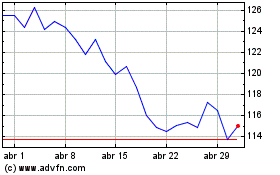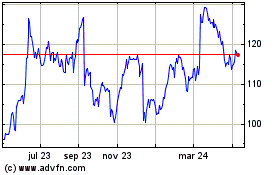By Robert Wall and Asa Fitch
Oracle Corp. said Mark Hurd, one of its two chief executives
officers, died Friday.
Last month Oracle said that Mr. Hurd, 62 years old, was taking a
medical leave of absence, removing the technology company's top
executive for sales and strategy at a time of intensifying
competition in the business-software market. Oracle didn't disclose
the cause of death and hadn't said what specific issues the CEO was
facing when he took leave.
The death leaves Safra Catz as Oracle's sole CEO. Since
September 2014 Oracle has had an unusual leadership structure in
which Mr. Hurd and Ms. Catz shared the CEO title, while co-founder
Larry Ellison is chairman and technology chief.
Mr. Ellison said, "Oracle has lost a brilliant and beloved
leader who personally touched the lives of so many of us during his
decade at Oracle."
Sweeping changes in the way businesses manage their data in
recent years have meant Oracle and other legacy
information-technology providers have struggled to maintain their
dominant position. Oracle's market capitalization has fallen 2.4%
since the announcement that Mr. Hurd would became CEO alongside Ms.
Catz. International Business Machines Corp.'s market cap is down
around 38% and Microsoft's is up around 175% over the same
time.
On Sept. 11, Oracle said Mr. Hurd was taking medical leave.
Changes in his appearance had prompted questions about his health
from analysts and journalists as far back as last autumn. At the
time, an Oracle spokesman said his health was fine and the company
had nothing to disclose about it.
Oracle Friday didn't respond to request for comment.
Mr. Hurd's death isn't like to lead to major changes at Oracle,
Nomura analyst Chris Eberle said, given the large involvement Mr.
Ellison has always had in setting the company's direction as
executive chairman and chief technology officer.
"Larry believes a dual-CEO structure is needed for the company,
so he wants to stay with that structure," Mr. Eberle said. "There
will be someone elevated from within, I think."
Oracle didn't respond to request for comment on whether the
company would add a second CEO alongside Ms. Catz.
Mr. Hurd, who was born in New York City, joined Oracle in 2010
after resigning his role as Hewlett Packard CEO on Aug. 6 that
year. The computer maker's board had investigated Mr. Hurd over his
relationship with a female contractor. Though the board found Mr.
Hurd didn't violate company's policy regarding sexual-harassment,
it found he violated company standards by submitting inaccurate
expense reports to conceal the relationship.
In a statement at the time, Mr. Hurd said that "there were
instances in which I did not live up to the standards and
principles of trust, respect and integrity that I have espoused at
H-P and which have guided me throughout my career." A spokesman for
Mr. Hurd said later that there was nothing untoward or improper
about Mr. Hurd's relationship with the contractor.
At H-P, he reorganized the company and pledged to eliminate
about 10% of its global workforce. Those moves helped propel the
company, at the time, ahead of rivals such as Dell and IBM.
After leaving H-P, he quickly re-emerged at Oracle, hired by Mr.
Ellison for the role. The two were tennis buddies and Mr. Ellison
had spoken out against H-P's board for pushing out the CEO.
When Mr. Ellison became Oracle's executive chairman, Mr. Hurd
became CEO in 2014 alongside Ms. Catz. Mr. Hurd helped move Oracle
to more aggressively pursue cloud-computing deals -- a booming
field in which the company had fallen behind rivals.
Mr. Hurd closely oversaw Oracle's sales structure as the company
battled to maintain its position as a large force in the
software-as-a-service market, where it is the No. 3, according to
research firm Gartner Inc. Mr. Hurd also had been closely involved
in Oracle's bid to win customers in the booming field of
cloud-computing to catch up with Amazon.com Inc. and Microsoft,
that dominate market. Although Oracle's cloud efforts have gained
pace in recent years, the company remains far behind the two cloud
giants.
Prior to joining H-P in 2005, where he replaced CEO Carly
Fiorina after she was fired, Mr. Hurd spent 25 years working his
way up the sales and marketing ranks at NCR, previously known as
National Cash Register Co. He started out as a junior salesman, was
named president in 2001 and CEO two years later.
When he took over NCR, it was struggling, coming off a year when
it posted a loss of $220 million. He quickly moved to expand NCR's
reach and cut costs. Under Mr. Hurd, NCR fired employees, some who
had spent their entire career there.
Mr. Hurd graduated with a B.A. in management from Baylor
University in 1979. He joined his alma mater's board of regents in
2014. He helped fund the university's tennis facilities, where he
played as a student, which was later renamed after Mr. Hurd.
While still at NCR, he co-authored a book with then CEO Lars
Nyberg on how people and companies can use data information to
improve business. Mr Hurd made Barron's best CEO list in 2008 while
at H-P.
Mr. Hurd married his wife Paula, who also worked at NCR, in
1990. They have two daughters.
Write to Robert Wall at robert.wall@wsj.com and Asa Fitch at
asa.fitch@wsj.com
(END) Dow Jones Newswires
October 18, 2019 16:12 ET (20:12 GMT)
Copyright (c) 2019 Dow Jones & Company, Inc.
Oracle (NYSE:ORCL)
Gráfica de Acción Histórica
De Mar 2024 a Abr 2024

Oracle (NYSE:ORCL)
Gráfica de Acción Histórica
De Abr 2023 a Abr 2024
